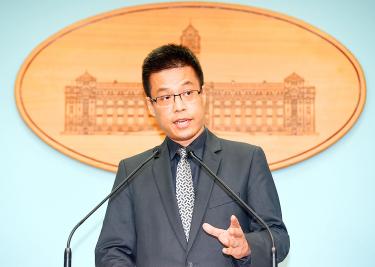The Presidential Office yesterday turned down former president Ma Ying-jeou’s (馬英九) application to travel to Hong Kong on Wednesday, citing national security concerns and the highly-sensitive nature of the planned destination.
Speaking at a news conference yesterday afternoon, Presidential Office spokesman Alex Huang (黃重諺) said that the office rejected Ma’s application after factoring in the counsel of an ad hoc group established to review the former president’s travel request.
“In light of the significance, particularity and sensitivity of the role of a retired president in the area of national security, as well as the lack of precedents, President Tsai Ing-wen (蔡英文) instructed Presidential Office Secretary-General Lin Bih-jaw (林碧炤) and National Security Council Secretary-General Joseph Wu (吳釗燮) to form an ad hoc group to evaluate the case and offer their suggestions,” Huang said.
Huang said the group solicited opinions from six government agencies — the National Security Council, the National Security Bureau (NSB), the Ministry of Foreign Affairs, the Ministry of National Defense, the Ministry of Justice and the Mainland Affairs Council.
After taking into account supplementary information submitted by Ma’s office and convening meetings on Tuesday and Wednesday last week, the group advised Tsai to turn down Ma’s application, Huang said.
The group cited four reasons to reject Ma’s travel plan in its report, including the continued need for the substantial amount of national classified information the former president had managed or handled to remain confidential and a longer period of time to examine the information.
The other two were listed as the difficulty to manage the potential risk of allowing a retired president to visit Hong Kong, which is considered a highly sensitive area in terms of national security, within the three-year regulatory period, as well as the absence of precedents of cooperation between the NSB and the Hong Kong Government and the lack of negotiations with China and Hong Kong on the matter due to time constraints, the group said.
“The advice is not meant to impede Ma from giving a public speech or speaking out for Taiwan in the international arena. They were tendered after the group weighed the pros and cons of the achievements that could have been made by Ma’s trip and the risk it could pose to national security,” Huang said.
Advising Ma to deliver his planned speech via video conference, Huang said it was the first time that a former head of state had applied to leave the nation within the three-year regulatory period since the 2003 promulgation of the Classified National Security Information Protection Act (國家機密保護法).
Ma sent his travel application to the office on June 1, before announcing his plan to attend and give a speech on cross-strait issues at the Society of Publishers in Asia’s Awards for Editorial Excellence ceremony to be held at the Hong Kong Convention and Exhibition Centre on Wednesday.
However, the act requires former presidents to obtain approval for any international travel plans within three years after leaving office and to file such an application 20 days prior to departure.
In response, Ma’s office issued a statement criticizing the Presidential Office’s decision as being disrespectful to retired heads of state.
“It is also detrimental to Taiwan’s image as a free and democratic nation,” the statement said.
“After considering the sensitivity of his destination, Ma decided to exercise a high level of self-discipline and stay for only seven hours, during which all of his schedules would be open and transparent,” it said.
Accusing the Presidential Office of applying double standards, Ma’s office said former president Lee Teng-hui (李登輝) held the presidency for 12 years, but was allowed to travel to the UK for several days at the invitation of the International Joseph Alois Schumpeter Society on June 27, 2000, a little more than a month after he left office on May 20 that year.
It also raised concerns that the Presidential Office’s decision could have been motivated by factors other than professional ones.
The Chinese Nationalist Party (KMT) also said the Presidential Office applied double standards, saying that it allowed convicted former president Chen Shui-bian (陳水扁) to attend a banquet earlier this month, but prevented a law-abiding former head of state like Ma from traveling overseas.
Democratic Progressive Party (DPP) lawmakers, on the other hand, praised the Presidential Office’s decision.
“An overseas trip by a former president absolutely carries the risk of confidential information leaking out, especially as Ma has picked as sensitive a place as Hong Kong,” DPP Legislator Tsai Yi-yu (蔡易餘) said. “Furthermore, filing the application 14 days before departure is against the law.”
DPP Legislator Lu Sun-ling (呂孫綾) said the decision was in accordance with public opinion.
Lu said that in the past few days, many people in her constituencies have expressed concerns that Ma might leak classified information during the trip to Hong Kong, or would stay abroad to avoid prosecution, as he faces a number of lawsuits.
Additional reporting by Loa Iok-sin
Source: Taipei Times - 2016/06/13









